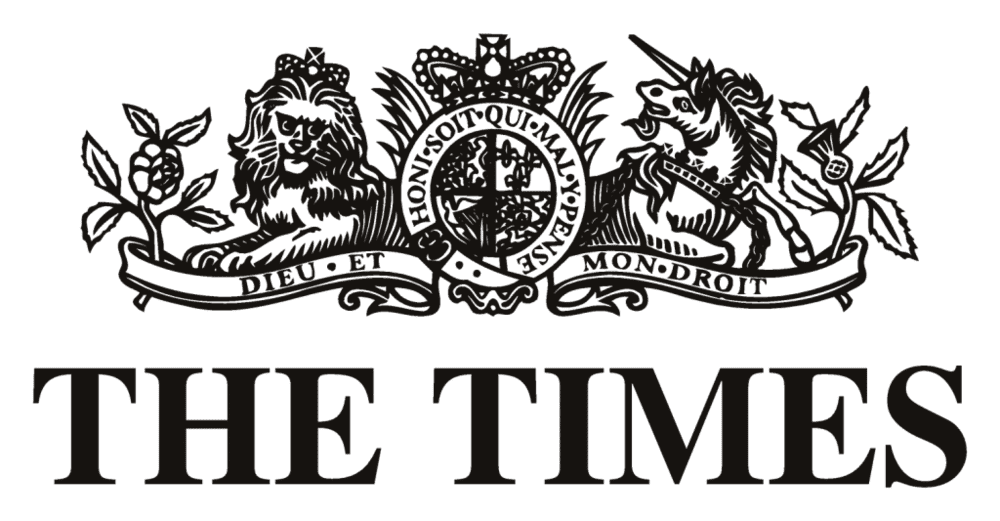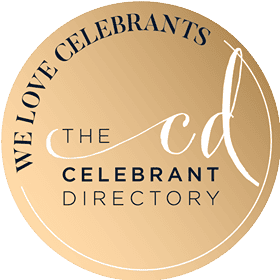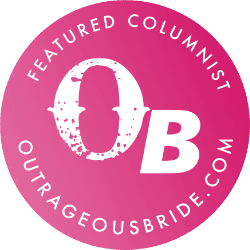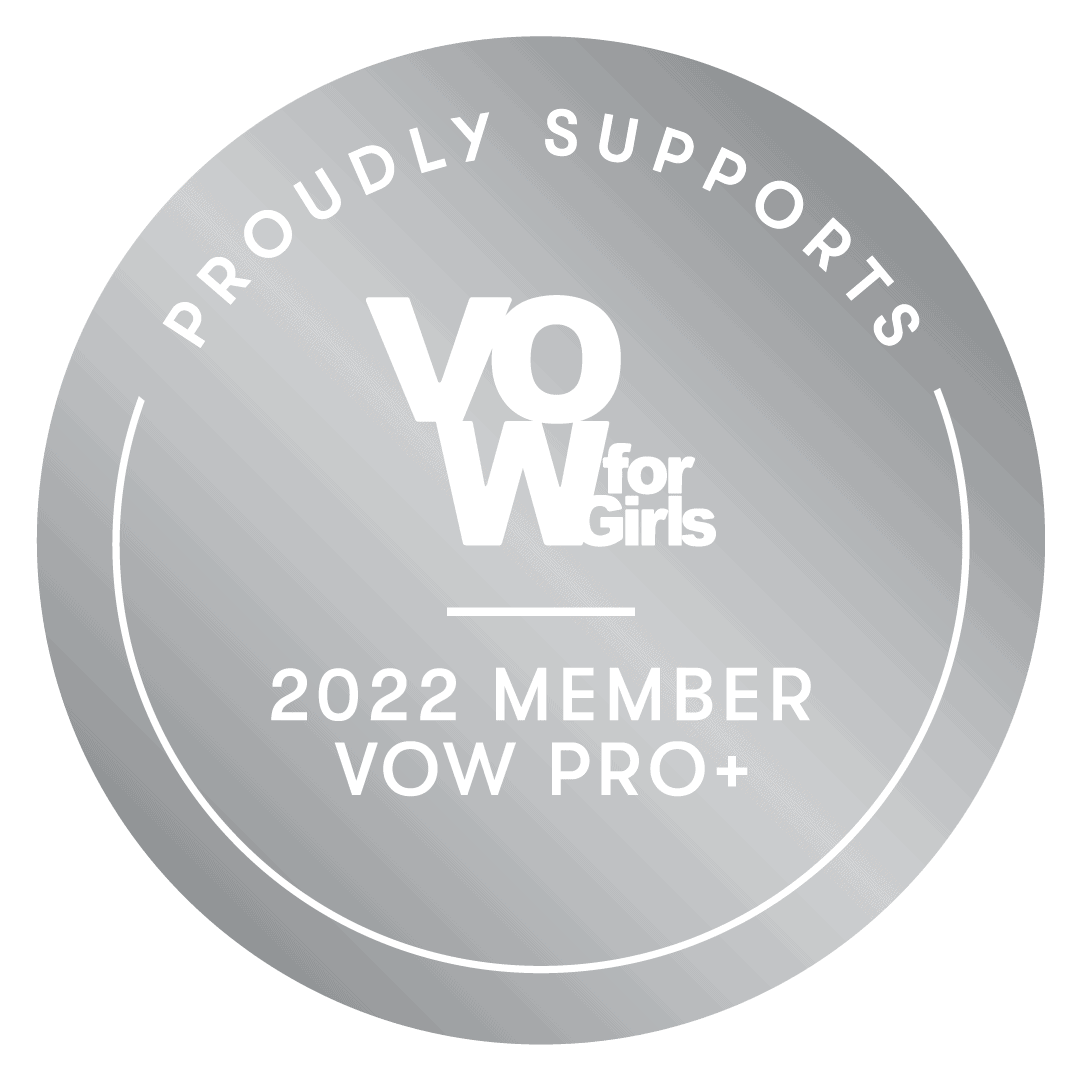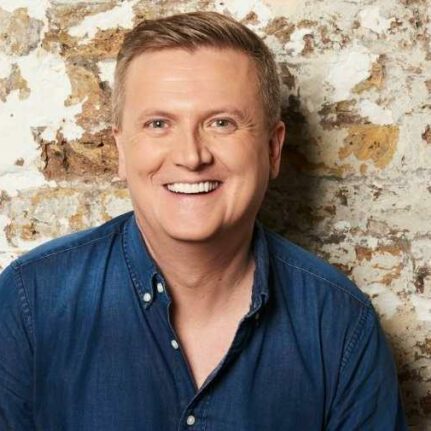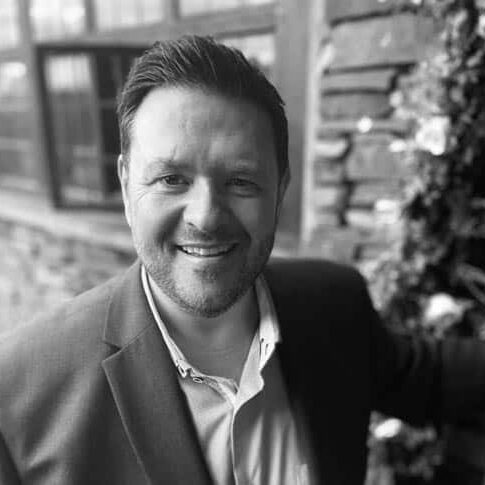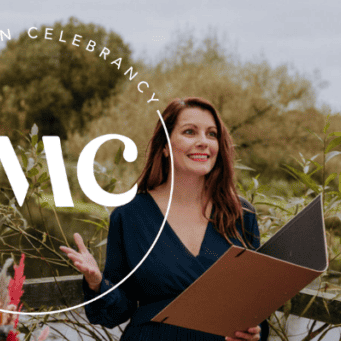Suzie Simmons is a Celebrant from Winchester, Hampshire who trained with The Academy of Modern Celebrancy. She has enjoyed a successful career as a Charity Fundraiser for small to medium-sized regional health-based charities and currently works as a head of fundraising and children and young adult hospice alongside her Celebrancy work. Suzie spoke to AMC founder Jennifer Claire about her journey to becoming a celebrant.
What inspired you to go from Charity Fundraiser to Celebrant?
So a few years ago, I reached a point where I realized I was halfway through my career. And I took a pause and thought about my future, had some coaching. And celebrancy was born from that.
My lightbulb moment, I guess, was that I identified that I’m really passionate about supporting people. And I love supporting people. And I particularly like supporting people when they need it most, which is where the funeral focus came in. And it also meant that there were lots of different pieces to the jigsaw puzzle as to why celebrancy became sort of my next avenue.
Why Funeral Celebrancy in particular?
For years, I’ve liked the idea of being a funeral director. I have no idea where that came from, but I’ve always thought I would like to do that.
Then a colleague’s husband passed away very suddenly. And we were at his funeral. And I said to another colleague, I said, Oh, I really like the idea of being a funeral director. And he said, “Oh you’d be good at that”, Before, and then after the service, he went, “Oh, no, he said, You’re too smiley said you won’t be good at that.” He said, “But you would be really good at the speaking bit.”
So various bits of the puzzle came together, and that’s what landed me. I know a few other people who have gone from fundraising to celebrancy as well; I think that’s a fairly common step. And it kind of brought all my skills together.
Related: Stuart’s Journey from Social Worker to Celebrant
Why becoming a celebrant appeals to Charity Workers
I think it’s that when you work in a community role or a support role, or you want to help people, you want to change lives, you want to support people in some of the toughest moments of their lives, but also some of the most beautiful moments of their lives that, a career in celebrancy, becoming a celebrant, really does slot in, it’s part of the jigsaw of life, where you can do it all, but you can do it for yourself as well.
Was starting your own business a consideration for you?
I have two primary school-aged children. And having that, or creating that flexibility to be around and be available for them more, was definitely part of the thought process.
As I said, I currently work as a celebrant and have continued working in my old role. And probably will continue to because I am someone that likes to have my fingers in lots of pots. I always thought I was a bit ‘flighty” until this coach I had said, Oh, look up a TED talk called a multi potentialite. And so it’s only about 15 minutes long this video and you know, when you watch something, and you go “ooh, that’s me!”.
So I like to have that variety, which celebrancy feeds into really beautifully as well because I started out with the funeral predominantly, but actually, now I do all kinds of Celebrancy. And it gives that variety and that difference, which keeps me motivated as well. So, going back to your question about having my own business and giving myself that choice and flexibility was absolutely definitely a real motivator.
How do you balance being a Celebrant with your existing job?
It’s a juggle, but I like that. I work part time at the hospice, and I have my set hours there. And then I plan my celebrancy accordingly around that, so I know what I’m available and what I can do. It can be a bit more challenging the funerals because of the short turnarounds and also not wanting to let funeral directors down.
But I’m lucky, I have a really understanding employer. Actually, I firmly believe my celebrancy really benefits my fundraising work as well; I’m just in the moment at the moment starting talks about how I could support our families when their child or young person dies, when as and when appropriate. As an extension to my celebrancy, but also combining the two. I do then do services that donate money to charities and have been for the hospice I worked at, which has been a really lovely combination of both my worlds.
I do have quite a bit of flexibility with my hospice role, so I just combine the two and just juggle it really, and have a very supportive husband.
Watch our free training: How to balance becoming a celebrant with an existing job
Do you find your Hospice work beneficial for your role as a Celebrant?
I think it fits in really beautifully. One of the things we talk about within the hospice is the fact that we don’t shy away from the fact that we do end-of-life care for children and young people. And it’s about giving people, both the individual and their families, the best experience we can in what is an impossibly horrendously horrible situation.
I’m really passionate about talking about funerals and getting people to talk about having that conversation before they die so that people are aware of the importance that they play in your grief journey. And within society. We’ve lost a lot of that over the years within Western society.
So both of my roles feed into each other really beautifully. It’s one of the things we talk a lot about in the work we do at the hospice.
Obviously, we work with funeral directors at the hospice as well, so that’s opened up some really lovely conversations because I can talk more, I’m not just talking to them about why they should get families to donate to the charity, it takes the conversation to a deeper level which I think absolutely then benefits the hospice.
Have you done any living funerals or ceremonies at the hospice?
Not yet, no. But I’d love to. Funerals are so amazing. And they offer such an important space for people for multiple reasons. So it’s obviously the acknowledgement that someone has actually died and that physically, they are no longer here.
But I think one of the most rewarding elements is when so many people turn up, and the family aren’t expecting that. And that whole impact that that person has had on a community that is more than what the family family we were expecting.
And I often think, if only you could have seen the impact that you’ve had on everybody. If you could have just seen the outpouring of love for you and the impact you’ve had. So I’d love to do a living funeral. I think it’d be amazing.
What do you think about having the ability to say goodbye to your loved one, like, it must change the whole grieving process from start to finish? But I think what we have in society is this reluctance to talk about death. Especially with long-term illness or when it comes to a hospice situation, having the ability to feel comfortable to talk about death.
The beauty of becoming a funeral celebrant is that it’s not taboo for us to talk about the passing of others and to open up that conversation for families that find it difficult. Is that something you’ve been able to do?
Yes, and I’m starting to do it more. Within the hospice, we have a chaplaincy team, and we have a chaplain. And it’s been really interesting having conversations with her about the work she does with our children and young people. Particularly those that have conditions that mean they’re completely cognitively able, so they’re fully aware of their own mortality. They know that they are going to die young, and work with them on how they process that and their own awareness around that.
It’s been interesting having conversations with her because she’s brilliant, and she has a spiritual impact because she is a Church of England priest. I’m an independent celebrant as well, and I’m not governed by any personal faith or any other faith, but also kind of wider in the community.
I’m a trustee of another charity, and through that, I’ve got to some other links. And there is a very well-known funeral director in our area, and also the Archdeacon of Winchester. The three of us have started having conversations about what’s within our power to start getting people to have the conversations.
Obviously, churches are keen for people to go back to having funerals in the church. But I think, you know, there is a real argument for having the conversation. There are people out there now that don’t think they want that [a church funeral]. But actually, if they thought about it, they’d probably still like to do that. But they don’t talk about it, and then they die. And then their family have to make that decision.
So I just like to open up the conversation to get people talking, however that may be and that they know what their options are. And so we’ve started those conversations, and we’re going to look to see what we can do across our networks. to just get that conversation going.
I did a funeral the other day, and it was for a lady. It was her niece and her husband who were organizing the funeral. And it was really interesting, because we then got on to talking about funerals, and the wife said, “Oh, I don’t want a funeral. I just want a Direct Cremation”. And her husband was like, “I know you do, but if you go first, I will really struggle with that”.
So we had a brief chat with the three of us, and they both said, “We need to actually sit down and have this conversation now”. Because it’s so important, a funeral is about the deceased, but it’s for the living, and so, actually, it is about what you want, but it’s also not about what you want. It’s what your loved ones need to help them process your death. So absolutely in my own small way. I’m trying to change things.
How do you feel your training, and also the community that’s around you has supported you in your growth?
It’s just phenomenal. When I look to train, obviously, there are various different places you can train with, So I looked at them all and weighed them all up, and obviously chose the Academy of Modern Celebrancy. And it’s just the depth of training. And all knowledge that comes with it is absolutely first class.
I really love the fact that you can choose what type of Celebrant training you want, you don’t have to do all of it. So, to begin with, I just did funerals because I thought this was what started me on this journey. So I’ll just do the funeral module, first of all. And then I’ve subsequently gone on and done weddings and namings. But you don’t have to, you can pick, and I think that’s a real strength of the training.
Because it means you focus on where your passions are and what you want to do. But the depth the course goes into, from my experience of having the other celebrants and finding out, absolutely surpasses any other.
You do have to put the time in, but you can put the time in in your own way. It’s not all on preset dates, and you come out at the end of the training genuinely 100% ready to do a service.
Do you still get nervous before a ceremony?
It’s really nerve-wracking at first. You’re doing something that’s really important in people’s lives, be it a funeral, wedding, or naming ceremony. I remember Brene Brown saying that somebody asked her if she still gets scared when she goes to these big arenas to do her talks. And she said, I don’t get scared, but I still get nervous because people are giving up their time. And time is the most precious thing people can give. And I thought that differentiating between scared and nervous is really key.
But I think you know, those first ceremonies you do nerve-wracking, but actually, what you then realize is your training has absolutely covered everything that it could possibly you could possibly need it to, and that you’re fully equipped to do what you need to do.
And then you have the whole community of your biggest cheerleaders. You can’t get any bigger cheerleaders than the AMC community. And they’re there if you have any questions and there’s no judgment. It’s a really safe community, and just really supportive, and I love that we share. The whole ‘community over competition’ is absolutely at the heart of it. And I can only sing its praises,
And actually, the funeral director in Winchester that I’ve been talking to is a very traditional funeral director. His family has been in the industry for multiple generations. He’s been the chair of the National fundraising directors, and when he asked me who I trained with, I said, “I’ve trained with The Academy of Modern Celebrancy”, he said, “Oh, yeah, they do it properly”. And I thought, yes, you’re quite right. They do it properly.
How has becoming a Celebrant changed your life?
It’s absolutely changed my life in terms of giving me that new focus and really satisfying that multi-potentiality nature that I have because it’s always different.
I’m a bit quiet on funerals at the moment, but I’ve got a few weddings coming up in the spring, so I’m really focusing on those. And it’s the variety that really motivates me.
I think it’s also given me confidence. The whole imposter syndrome thing has been very real in my life for many, many years. And I think going out and doing this and realizing that I’m actually good at it, and I get really beautiful feedback, has boosted my confidence across everything, really.
It has also made me find my mojo with fundraising again, which I felt like I’d lost a bit, hence why I had that coaching in the middle of my career. Where I’d thought, “You know, I love fundraising. But do I really want to be still doing this in 20 years time? I know I don’t want to go higher that than the level I’m at.”… And it’s just really, really motivated me and given me a real focus. I also love that my kids are so open to what I do.
It’s a really, really special role.
Would you share some of your favourite Celebrant experiences?
I did a beautiful adoption cert ceremony last year, which was just really magical for a family, who had struggled for many years to become parents and adoption had been the route it was just wonderful to be a part of these beautiful moments.
And obviously, weddings are incredible. I did a wedding for an older couple last year who had both been happily married but were widowed. And then found each other as companions. They didn’t actually want to get married legally because they had their families and everything all the legalities were best to keep separate. So kind of fell upon having a celebrant wedding. And then we created this really beautiful sand ceremony with 20 children, because they wanted to include all their grandchildren and their great nieces and nephews. And it was beautiful.
They suggested it, and I said, “Yeah, let’s go for it. Let’s give it a try.” They wanted to include the kids. And I’m all for that. Let’s just include them and involve them in it. And I was like, “it’s gonna go one way or the other is horrendous, and there’s gonna be sand everywhere. Or it’s gonna be amazing”. And it was amazing. They were left with this beautiful vase.
Trying to find 20 different-coloured sands—that was really challenging! It was very difficult, but we did. It’s just a really special job. And it’s a real honour to do it and a real privilege to be part of people’s events, any life event, happy or sad. It’s just amazing. I’m very glad I’ve done it. It’s amazing to find a job that doesn’t feel like work because I love my job.
Feeling Inspired? Train to become a Celebrant with the Academy of Modern Celebrancy
If you want to change your life in the way Suzie and hundreds of others have already done, check out our industry-leading Celebrant courses and start your journey to becoming a Celebrant today.
Jennifer Claire
Jennifer is the Director of the leading celebrant training company, The Academy of Modern Celebrancy as well as the Founder of The Celebrant Directory, supporting over 600 celebrants globally.
Jennifer run a 2.5k community of celebrants who she dedicates her time to helping them grow their businesses and taking celebrancy from a hobby to a lifestyle.
Jennifer heads up the global Celebrant Industry Awards and the global celebrant summit, Celebrantopia each year!
A celebrant herself since 2010, she knows what it takes to make it in the industry and trains the best celebrants out there across the UK, Europe and the USA.
Take the Quiz to find out if you have what it takes!
Download the Ultimate Guide to becoming a Celebrant & find out how you can make this happen!

If you liked this article you may enjoy ...
Aled Jones Celebrant Spotlight
Here at The Academy of Modern Celebrancy, we’ve trained our fair share of award-winning, rockstar Celebrants, but when bone fide global superstar and voice of an angel, Aled Jones, MBE, decided to train as a Celebrant with us, we have to admit, the team here were more than a little bit excited. Aled very generously…
Social Worker to Funeral Celebrant: Interview
Stuart Entwistle’s journey from a senior Social Worker to Funeral Celebrant is nothing short of inspiring. Graduating from The Academy of Modern Celebrancy in 2021, Stuart’s career transition reflects a deep-rooted desire to connect with people at pivotal moments in their lives. His extensive background in social work, spanning over two decades, laid a solid…
Law Commission Recommendations Published
So the wait is over, the review of the Marriage Act 1949 has been completed and recommendations passed over to government. And guess what? It’s positive for Independent Celebrants in England and Wales and for couples across the country. For 70 years, the marriage act has excluded the recognition of multi-faith, non faith, secular or…
As featured in
